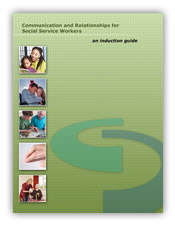Social service practiceSocial services is a dynamic and ever changing area of work which demands that the people who work within it have strong core values that are at the heart of everything they do. All social service workers should maintain a focus on building relationships and achieving better outcomes with and for people who use services. To do this they themselves must be supported, skilled and informed and be committed to their own continuous learning and development. This culture of improvement must be cultivated and promoted by managers and leaders at all levels to ensure that the best possible outcomes are achieved for people who use services and also for the workforce who supports them. The themes below are relevant to workers in all areas of social services. |
|
Personal outcomes should primarily be understood as what matters to the person. Working with people using services and unpaid carers to focus on their outcomes builds on the assessment and support skills that are fundamental to all social services’ roles.
Workers should:
- understand a personal outcomes approach as working with an individual and those around them to identify what is important to the person, and to agree how best their needs can be met and outcomes achieved.
- be able to relate an outcomes approach to their particular role and area of work.
- recognise the importance of meaningful conversations that focus on the whole person within their family and community.
- encourage creative approaches that build on strengths while being realistic about what is possible.
- understand Self-Directed Support as putting individual outcomes, choice and control at the heart of support arrangements, and be aware of the Social Care (Self-Directed Support)(Scotland) Act 2013.
More information about a personal outcomes approach within health and social care is available here.
More information about improving outcomes for children and young people within the Getting it Right for Every Child (GIRFEC) framework is available here.
For more information about self-directed support and the Social Care (Self-Directed Support) (Scotland) Act 2013 click here.
Building trusting and genuine relationships with people who use services and their unpaid carers is central to all roles within social services. The experience that people have in accessing services and support can have a significant influence on the extent to which other outcomes are achieved.
Trusting relationships between people who use services and workers benefit everyone involved. Assessments and support plans need to be respectful and meaningful to the person using services; recognising strengths, family and community connections while confirming responsibilities and decisions made
Workers should:- recognise the difference their personal involvement can make to someone who uses services.
- understand the impact of unequal balances of power and make sure power is given to people who use services.
- uphold the rights of people who use services, regardless of their background, and challenge discrimination.
- maintain trust in social services by upholding the values in the SSSC codes of practice, such as honesty and integrity.
- record outcomes in assessments and support plans in a way that is understood by all.
More information about recording outcomes is available here.
The SSSC codes of practice are available here.
Social services workers are increasingly working in joint teams or shared settings, with colleagues in health, education, police and other services. In order to best support better outcomes for people who use services, workers need to be comfortable working flexibly with these partners. Self-Directed Support also reinforces the importance of partnership working with people who use services, their carers and with communities. It emphasises that people should be recognised as equal partners with key strengths and not just as ‘people in need’.
Workers should:
- be skilled in working in together with people who use services and those around them, recognising and valuing everyone’s contribution
- recognise that working in partnership successfully often means “letting go” of power
- recognise that improving outcomes for individuals should be central to working together
- understand how health and social care integration will relate to their area of working
- support people who use services, and those around them, to use their strengths to make meaningful connections with their local and wider communities
More information about partnership working and the importance of maintaining a focus on outcomes for individuals is available here.
More information about Self-Directed Support is available here.
All social services workers have a responsibility to protect people at risk of harm. To do this, workers must be able to recognise when somebody might be at risk of harm and be aware of what they need to do. These can be complex and uncertain situations and it is important for workers to recognise the conflicts involved, such as balancing the responsibility to protect with the right to live independently and take risks.
Workers should:
- understand and recognise different types of harm
- know the relevant legislation and their organisation's policies and procedures in relation to child protection and adult support and protection
- know their own responsibilities for recording and sharing of information if they suspect harm has or is likely to occur
- understand the benefits of risk taking while being aware of and respond to possible dangers
Child protection should be seen in the context of the wider GIRFEC approach as well as national guidance and organisational child protection policies.
More information about about the GIRFEC approach is available here.
More information about child protection is available here.
The Adult Support and Protection (Scotland) Act 2007 requires councils and a range of public bodies to work together to support and protect adults who are unable to safeguard themselves, their property and their rights. More information is available here.
Information about how human rights can provide a basis for protecting people can be found through the Scottish Human Rights Commission.
Social service workers need to be enabled to protect themselves as well as others from harm and abuse. At the point of induction, employers should ensure that staff:
- know their organisation's policy in relation to personal safety
- are aware of their right to work in a safe environment in which the risks to personal safety have been minimised
- know the boundaries and limitations of their role
- know when it is appropriate and acceptable to ask for help
- know who is their health and safety representative
Some workers including childminders are lone workers. They need to ensure they consider risks and personal safety in a way that is appropriate to the service they offer. This might include always having standby emergency contacts to support them in times of crisis. Childminders should work closely with the Care Inspectorate and their professional organisation to ensure they have a way of ensuring this happens.
Effective communication is at the heart of good practice. It involves many skills. For staff new to the sector, it is essential to consider the following aspects of communication at the point of induction:
- developing supportive, valuing relationships
- listening skills
- using verbal and non-verbal communication
- using understandable language
- exploring how best to communicate with each individual
- understanding and dealing with barriers and difficulties which may affect communication
- using observation skills and writing records so that appropriate information is passed on
Once completed, this will highlight strengths and areas for improvement in the area of communication and can provide the beginnings of a personal development plan for the staff member.
SSSC has developed an iPad based learning resource focused on Communication and Relationships for social service workers. You can get this free learning resource here. |
 |
 |
Social service workers must be enabled to understand that they are accountable for the quality of their work and for maintaining and improving their knowledge and skills. In order to do this staff need support to:
- understand their job
- understand any new procedures that are put in place and attend training for these if necessary
- question poor practice
- have opportunities for supervision and on-going learning and training
- have opportunities for constructive feedback from service users, carers, colleagues and other relevant people. Find ways of engaging with children that means you get feedback from them
- contribute positively to working with and learning from people from different backgrounds and agencies who may be working alongside them or in partnership with them
- keep a personal development plan and a learning log/reflective diary of their on-going learning and development
At the induction stage, employers and, in particular, line managers, should ensure that new staff members are informed about the organisation's policies and procedures in relation to the points above. However, more important than policy statements is the manager's role in creating a working environment which actively promotes reflection on practice and the continuous development of staff.
To help staff plan and structure their CPD activity, SSSC has developed a career development toolkit (which includes personal development planning). You can download the toolkit here. SSSC has also developed an iPad based learning resource focused on ongoing learning and development for social service workers. You can get this free learning resource here. |
 |
 |
Social services need effective leadership at all levels within the workforce. Organisations should support workers to recognise the difference they can make to the lives of people who use services, their colleagues and others. Organisations, managers and workers need to make time for this to happen through supervision and other support.
Workers should:
- be clear about their role and responsibilities, and those of their colleagues and managers
- develop skills of reflection, and use these to continually inform and improve their practice
- have and make opportunities for receiving feedback from a range of people, including people who use services and unpaid carers, and use this to develop their practice
- recognise how they use and develop their leadership skills and support others to do so
- be accountable for what they do
- take responsibility for their on-going learning and development and contribute to the development of their team and organisation
- use supervision to achieve all of this and ultimately to lead to better outcomes for service users and carers
The Continuous Learning Framework (CLF) and Step into Leadership portal provide frameworks for workers to develop, particularly in relation to leadership and further guidance on outcomes focused supervision is available here.
Given the commencement of registration and regulation of the social service workforce in April 2003, it is important that organisations are clear about whether or not new recruits will be subject to registration by the SSSC or another relevant regulatory body (and if so, when?). Also, amendments to the National Care Standards refer to employers having a staff development strategy and yearly training plan in place for all staff which focuses on them achieving the qualification required for registration with the SSSC. Therefore it will be important that employers identify if new recruits hold the qualification(s) required for registration or have yet to gain them (further information is available here).
Employers also have a key role in supporting all their registered workers to meet Post Registration Training and Learning (PRTL) requirements, including those regarding specific training for all social workers on protection of children and adults from harm, and the extended PRTL requirements for newly qualified social workers.



